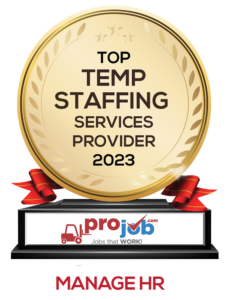
So you think you have a strong work ethic?
Who you are in the workplace: your values, your commitment to your work, your attitude, your interpersonal and professional skills, all contribute to your “work ethic.” Work Ethic is defined as “a belief in work as a moral good, or a set of values centered on the importance of doing work and reflected especially in a desire or determination to work hard.”
In short, WORK HARD. Who does this apply to? Work ethic isn’t just something an employee must have, but the employer needs to have a strong work ethic as well. No one wants to work for someone they can’t trust or respect, and no one wants to have an employee they can’t trust to get the job done.
How do you know if you truly have a strong work ethic? Let’s look at some of the ways we can tell that our work ethic is strong:
#1 – Integrity
So, what does integrity have to do with a strong work ethic? To have integrity, means you are someone who can be trusted, someone of your word, someone who owns their mistakes and becomes stronger for it. It means being honest, remaining humble, and showing respect to those you work alongside with. It means doing the work you were hired for, whether you’re being watched or not.
If you are the boss, your integrity sets the tone for the company, and all those down the chain of command. If you are the employee, your level of integrity either makes the company stronger or weaker. Some companies wonder why they have a high turnover rate, and have a hard time identifying what is causing it. In most cases, it’s the company culture and the leadership style and tone of the boss. Many people leave their jobs primarily because they do not like the style of leadership of those above them, and it becomes intolerable to the point that they seek other work in hopes of a better culture and leadership style. But that’s not always the case, sometimes it may be because of not enough wage, the job itself needs to be modified, lack of potential growth, or other extraneous variables. Some people get fired, for simply not having integrity in the workplace. They don’t prioritize their work and don’t show up to work as scheduled, they are late regularly, they slack on their work, or they may even steal from the company. There are many reasons an employee is fired, but lack of integrity is probably the quickest and surest way to get fired. As a boss, it’s your job to lead by example the expectations you expect your employees to hold to, as well as develop a style of leadership that inspires and helps your employees thrive in the workplace. As an employee, it is your responsibility to show your employer how committed you are to your work. But what does that look like?
#2 – Quality of Work
When we look at quality of work, we are looking at whether or not you are contributing to the overall company goal, as well as the goal of your individual position. Are you improving, growing, and investing in the quality of your work? Or are you merely showing up? Investing in your quality of work, is a personal dedication of anyone with a strong work ethic.
When performing your job duties, you should always be focused, determined, and dedicated to your company’s overall goal. This is what Google, Apple, Facebook, and several other mega companies do well that contribute to their overwhelming success. They focus on bringing everyone to the same page from top to bottom, making their vision and goals clear. They focus on inspiring growth through their leaders as they lead passionately by example. As a result, their employees develop such passion for the company goals that they challenge themselves and steadily perform above and beyond. Their employees invest in their own part by working diligently in their own job duties, while maintaining a clear vision of the company’s overall goal. That’s not to say that same model is going to work for every company, but the idea is such that when a leader leads by example and holds to the standards they set, most often their employees will follow their lead.
So how do you improve your quality of work? As an employee, it is your duty to not only do your job, but also improve at doing your job. The quality of your work will always be improving when you have a strong work ethic. If you find yourself stagnant, consider whether you are really dedicated to your company, and seek ways to improve. On the same note, a good leader and employer will always find ways to coach you by strengthening you in your skills, and help you identify ways you can improve. A great leader will always lead by example, while inspiring their employees toward growth. Their goal will always be aimed at creating a better team and strengthening its players.
#3 – Professionalism/ Responsibility
Having professionalism, means showing up to work on time, prepared and ready to do your work with a strong work ethic. It means being respectful, and able to communicate effectively. Whether you are an employer, or employee, your professionalism and ability to take responsibility will set the tone for your work relationships.
For an employee, it means being open to constructive criticism and being open to direction. For an employer, it means listening to your employees and hearing them out while incorporating their concerns into your leadership and expectations. That may mean you change your direction, or it may mean explaining your vision in a clearer way, and the reasons behind it so that your employee can see your vision and get on board.
#4 – Time Management
So what do you focus your time at work on? Is that the most effective use of time? Could you improve your time management? How organized are you? Do you have a plan from start to finish? How disciplined are you in completing your work effectively? Are you improving in your work flow? These are questions, every employee, and employer should be asking themselves. The key is to keep a close eye on how you spend your time, and to prioritize based on importance and needs. Every small thing adds up, so limit any distractions, and stay focused. Communicating your time restraints when being asked on a whim to do something, may be necessary. Employees must be flexible, while employers may need to adjust their expectations.
#5 – Team Work
It’s important to remember that you’re not a one man show. The first thing you learn when you are on a team, is that you work as a team. Everyone has their roles to play and communicating effectively while working hard to strengthen the team is essential for any team member. Without effective communication, and a clear goal in mind for all team members, chaos occurs. When we are at work, unless we work for ourselves and have no employees, then we are a part of a team. It’s important for all team members to not only know what the company goals are, but also to be on board with giving 100% of their efforts toward that goal. Each player needs to recognize their strengths and weaknesses, and then as a team you build one another up. Whether you are the leader, or the one being directed, your attitude toward the goal, is going to make or break you. It’s the leader’s job to make the goals clear and have realistic expectations. Considering that, sometimes “teams” don’t win, and they lose the game to other teams. But they go back out there and give it their all the next time around. These days, it seems that trophies are given out just for showing up, but that’s a mistake because it takes all the competition and challenge out of the game and improves nothing. No skills are built, and there is little ambition to improve. In high school baseball, at the end of a game, the team that loses and the team that wins, will get in a line, and give the other team a high five. The reason they do this, is to show good sportsmanship. So, how do we do that in the workplace? We need to strive to be a team that wins together, and loses together, but gets right back up with a great attitude while improving as a team. Sure, we can be bummed or frustrated, but that’s not going to change the results. The team needs to practice together, recognize their failures, and focus on their strengths, while improving together. Improving their communication, improving their skills, or even improving their attitude can make the difference between losing, and winning.
So, with all this in mind, consider your own work ethic, and never stop improving!
-BDI Staffing
“Changing lives, one person at a time.”

